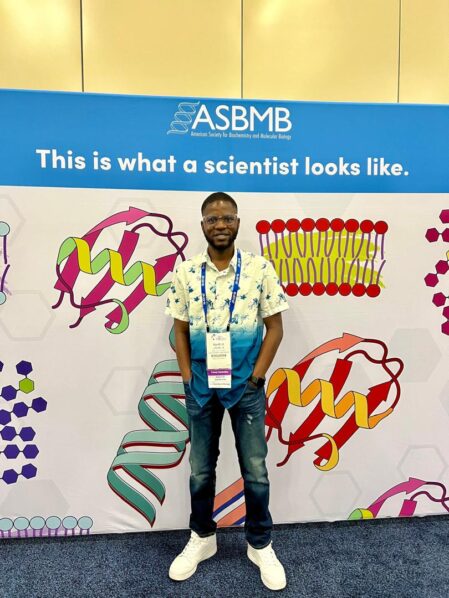
In this interview, we spoke with an expert in drug discovery, biophysics, and infectious diseases, Mr. Toheeb Balogun who leverages computational approaches to accelerate the drug discovery process and unravel disease mechanisms.
Can you tell us about what inspired you to pursue a career in scientific research?
Thank you for the opportunity. My inspiration to pursue a career in scientific research stems from my commitment to addressing global health challenges through innovative discoveries. I hold a first-class degree in Biochemistry from Adekunle Ajasin University Akungba-Akoko (AAUA), Nigeria where I graduated at the top of my cohort and gained a deep understanding of disease pathogenesis and pharmacology. I then worked as a Research Scientist in the Phytomedicine and Computational Biology Laboratory, Department of Biochemistry, AAUA, where I led impactful research projects that resulted in highly influential scientific publications. These projects ranged from elucidating the mechanisms of diseases such as cancers, neurological disorders, and viral infections to developing small molecule drug candidates targeting these conditions.
My research on developing inhibitors against the main drivers of coronavirus infection in response to the global pandemic published in Frontiers in Chemistry was supported by research grants from France National Research Institute and prominent universities in Saudi Arabia. I have also spearheaded the identification of nimbanal as a promising therapeutic agent in blocking viral replication in respiratory syndrome coronavirus published in Informatics in Medicine Unlocked Journal. Additionally, using molecular dynamics simulation, this study characterized the dynamics of nimbanal in complex with Papain Like Protease (PLPro) – one of the key proteins involved in coronavirus infection. This has practical implications in which nimbanal may help to curb SARS-CoV-2 infection by targeting PLPro. These were fundamental moments during my career where I used my diverse skillsets in drug discovery and biophysics to address pressing unmet medical needs.
What made you found IBMT, and what impact has it made?
I founded the Institute of Bioinformatics and Molecular Therapeutics (IBMT) to address critical gaps in knowledge and skills in drug discovery, vaccine design, and computational biology, particularly in developing countries such as Africa. IBMT is a diverse team of scientific advisory boards, research scientists, workshop facilitators, and interns who are making significant strides to advance scientific research and train the next generation of scientists. As the Director of Training and Research, I have spearheaded initiatives that provide hands-on training to local and international researchers at various career stages. Through workshops, mentorship programs, and internships, IBMT has empowered participants with advanced computational skills, such as molecular docking, pharmacokinetics modeling, immunoinformatics, and molecular dynamics simulations. These efforts have had far-reaching impacts. Many IBMT trainees have published high-quality research articles in leading journals and presented their findings at prestigious scientific conferences. Several have also gone on to secure international scholarships to pursue advanced degrees at top universities worldwide. Additionally, IBMT has established partnerships with leading institutions in Nigeria and globally, further demonstrating its reputation as a distinguished and respected organization in the scientific community.
The transformative impact of IBMT’s work is evident in the success stories of its trainees, who continue to contribute to scientific advancement and innovation. This underscores IBMT’s role in bridging the gap between scientific knowledge and practical applications in addressing global health challenges.
What is your current research focus, and why is it important?
I am a doctoral researcher in the Department of Molecular Biology at the University of Califonia, San Diego – one of the world’s top universities in biology and its related disciplines. My current research focuses on investigating the dynamics of viral glycoproteins, particularly in coronaviruses and the Ebola virus, while designing entry-level inhibitors to combat these deadly pathogens. This research is critical for understanding how these viruses evade the human immune system and develop resistance against frontline therapeutics. By leveraging molecular modeling techniques, I construct realistic biological models that are often inaccessible through experimental methods, providing unprecedented insights into the mechanisms of viral infections. These insights are instrumental in the development of effective vaccines and antivirals, which are crucial for pandemic preparedness.
One of my recent studies uncovered the genetic pathways involved in the molecular adaptation of bat coronaviruses during zoonotic transmission. Using computational modeling and molecular dynamics simulations, I delineated the structural differences between wild-type and mutant bat coronaviruses. I presented this impactful work at the American Society for Biochemistry and Molecular Biology conference held in San Antonio, Texas in March 2024. The relevance of this work highlights its significant contributions to understanding zoonotic diseases and preparing for future outbreaks.
Your work also focuses on developing effective antivirals for pandemic preparedness. Can you explain more about this?
The recurring outbreaks of viral infections, such as coronaviruses and the Ebola virus, emphasize the world’s vulnerability to future pandemics. To address this, I have made significant progress in developing broad-spectrum antivirals to combat viral outbreaks. For instance, I identified a unique druggable site on the SARS-CoV-2 spike glycoprotein that is conserved across all coronaviruses. This discovery represents a valuable target for antiviral drug development, and I had the privilege of presenting this work at the Midwest Center for Antiviral Drug Discovery Workshop held at the University of Minnesota, USA.
Despite the deadly nature of the Ebola virus (EBOV) and its socioeconomic impact on Africa, there is still no approved small-molecule drug to treat this virus. Through structure-based drug discovery and cheminformatics, I have identified compounds that block EBOV entry into human cells. This research was presented at Baylor College of Medicine in Houston in March 2024 and underscores the urgency of developing treatments for this lethal virus.
These studies collectively demonstrate my commitment to advancing antiviral drug development and ensuring that the world is better prepared for future pandemics.
How are you pioneering solutions for global health resilience and pandemic preparedness?
My research contributes significantly to antiviral drug development and understanding of the mechanisms of viral infections, both of which are essential for pandemic preparedness and advancing global health. The overarching goal of my research endeavors is to build a resilient future where pandemics do not catch us off guard. By addressing critical health challenges, my scientific pursuits pave the way for new treatments and preventive strategies, making a lasting impact on global health.
What advice do you have for young talents like yourself in the field?
It is essential to pursue rigorous training to build a solid foundation as a scientist. I encourage individuals to seek opportunities for hands-on experience with cutting-edge techniques in their field. For those interested in computational drug discovery and biophysics, acquiring skills such as molecular docking, molecular dynamics simulations, machine learning, and free energy calculations is crucial. Similarly, gaining fundamental knowledge in immunology and microbiology, along with proficiency in immunoinformatics tools, is vital for vaccine design. These are the types of training we provide at the Institute of Bioinformatics and Molecular Therapeutics (IBMT), which have benefited many young talents immensely. In addition, attending and presenting work at scientific conferences whether digitally or in person is highly beneficial. This provides a platform to showcase research to the scientific community, enhance visibility, and build a strong professional reputation. Conferences, workshops, and seminars also offer opportunities to network with other researchers in the field, which can lead to fruitful collaborations and open new opportunities.
It is equally important to apply acquired skillsets to solve real-world problems and drive innovation. This not only demonstrates the practical impact of scientific research but is also incredibly fulfilling. Publishing findings in reputable journals further establishes individuals within the global scientific community. For researchers in developing regions, such as Africa, where funding may be limited, I recommend exploring international funding opportunities and utilizing freely available tools, which are becoming increasingly accessible through the open science movement.
Finally, patience is key. Making innovative discoveries or publishing high-quality scientific articles takes time and perseverance. Learning the required skill can sometimes feel daunting, and research may not always go as planned. However, every challenge offers a valuable learning experience. Dedication, commitment, and persistence are essential. Over time, these qualities will help individuals grow into better scientists and contribute meaningfully to their field.






